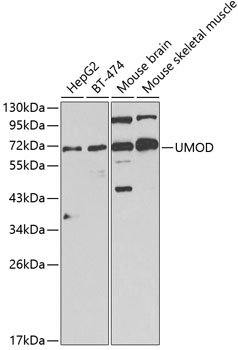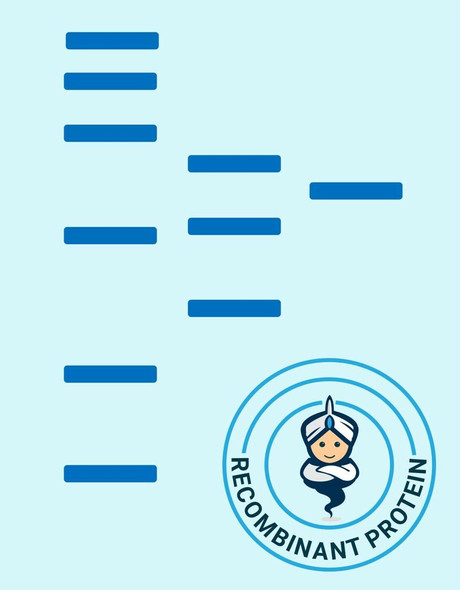Cell Biology Antibodies 7
Anti-UMOD Antibody (CAB1920)
- SKU:
- CAB1920
- Product Type:
- Antibody
- Reactivity:
- Human
- Reactivity:
- Mouse
- Host Species:
- Rabbit
- Isotype:
- IgG
- Research Area:
- Cell Biology
Description
| Antibody Name: | Anti-UMOD Antibody |
| Antibody SKU: | CAB1920 |
| Antibody Size: | 20uL, 50uL, 100uL |
| Application: | WB |
| Reactivity: | Human, Mouse |
| Host Species: | Rabbit |
| Immunogen: | Recombinant fusion protein containing a sequence corresponding to amino acids 315-615 of human UMOD (NP_001008390.1). |
| Application: | WB |
| Recommended Dilution: | WB 1:500 - 1:2000 |
| Reactivity: | Human, Mouse |
| Positive Samples: | HepG2, BT-474, Mouse brain, Mouse skeletal muscle |
| Immunogen: | Recombinant fusion protein containing a sequence corresponding to amino acids 315-615 of human UMOD (NP_001008390.1). |
| Purification Method: | Affinity purification |
| Storage Buffer: | Store at -20'C. Avoid freeze / thaw cycles. Buffer: PBS with 0.02% sodium azide, 50% glycerol, pH7.3. |
| Isotype: | IgG |
| Sequence: | CQCK QDFN ITDI SLLE HRLE CGAN DMKV SLGK CQLK SLGF DKVF MYLS DSRC SGFN DRDN RDWV SVVT PARD GPCG TVLT RNET HATY SNTL YLAD EIII RDLN IKIN FACS YPLD MKVS LKTA LQPM VSAL NIRV GGTG MFTV RMAL FQTP SYTQ PYQG SSVT LSTE AFLY VGTM LDGG DLSR FALL MTNC YATP SSNA TDPL KYFI IQDR CPHT RDST IQVV ENGE SSQG RFSV QMFR FAGN YDLV YLHC EVYL CDTM NEKC KPTC SGTR FRSG SVID QSRV LNLG PITR KGVQ ATVS R |
| Gene ID: | 7369 |
| Uniprot: | P07911 |
| Cellular Location: | Apical cell membrane, Basolateral cell membrane, Cell projection, GPI-anchor, Lipid-anchor, Secreted, cilium membrane |
| Calculated MW: | 55kDa/66kDa/67kDa/69kDa/73kDa |
| Observed MW: | 70kDa |
| Synonyms: | UMOD, ADMCKD2, FJHN, HNFJ, HNFJ1, MCKD2, THGP, THP |
| Background: | The protein encoded by this gene is the most abundant protein in mammalian urine under physiological conditions. Its excretion in urine follows proteolytic cleavage of the ectodomain of its glycosyl phosphatidylinosital-anchored counterpart that is situated on the luminal cell surface of the loop of Henle. This protein may act as a constitutive inhibitor of calcium crystallization in renal fluids. Excretion of this protein in urine may provide defense against urinary tract infections caused by uropathogenic bacteria. Defects in this gene are associated with the renal disorders medullary cystic kidney disease-2 (MCKD2), glomerulocystic kidney disease with hyperuricemia and isosthenuria (GCKDHI), and familial juvenile hyperuricemic nephropathy (FJHN). Alternative splicing of this gene results in multiple transcript variants. |
| UniProt Protein Function: | UMOD: Uromodulin: Functions in biogenesis and organization of the apical membrane of epithelial cells of the thick ascending limb of Henle's loop (TALH), where it promotes formation of complex filamentous gel-like structure providing the water barrier permeability. May serve as a receptor for binding and endocytosis for cytokines (IL-1, IL-2) and TNF. Facilitates neutrophil migration across renal epithelial. Defects in UMOD are the cause of familial juvenile hyperuricemic nephropathy type 1 (HNFJ1). HNFJ1 is a renal disease characterized by juvenil onset of hyperuricemia, polyuria, progressive renal failure, and gout. The disease is associated with interstitial pathological changes resulting in fibrosis. Defects in UMOD are the cause of medullary cystic kidney disease type 2 (MCKD2). MCKD2 is a form of tubulointerstitial nephropathy characterized by formation of renal cysts at the corticomedullary junction. It is characterized by adult onset of impaired renal function and salt wasting resulting in end-stage renal failure by the sixth decade. Defects in UMOD are the cause of glomerulocystic kidney disease with hyperuricemia and isosthenuria (GCKDHI). GCKDHI is a renal disorder characterized by a cystic dilation of Bowman space, a collapse of glomerular tuft, and hyperuricemia due to low fractional excretion of uric acid and severe impairment of urine concentrating ability. 4 isoforms of the human protein are produced by alternative splicing. |
| UniProt Protein Details: | Protein type:Membrane protein, GPI anchor Chromosomal Location of Human Ortholog: 16p12.3 Cellular Component: apical plasma membrane; basolateral plasma membrane; extrinsic to membrane; spindle pole Molecular Function:IgG binding Biological Process: cellular defense response; heterophilic cell adhesion; leukocyte adhesion; negative regulation of cell proliferation Disease: Glomerulocystic Kidney Disease With Hyperuricemia And Isosthenuria; Hyperuricemic Nephropathy, Familial Juvenile, 1; Medullary Cystic Kidney Disease 2 |
| NCBI Summary: | The protein encoded by this gene is the most abundant protein in mammalian urine under physiological conditions. Its excretion in urine follows proteolytic cleavage of the ectodomain of its glycosyl phosphatidylinosital-anchored counterpart that is situated on the luminal cell surface of the loop of Henle. This protein may act as a constitutive inhibitor of calcium crystallization in renal fluids. Excretion of this protein in urine may provide defense against urinary tract infections caused by uropathogenic bacteria. Defects in this gene are associated with the renal disorders medullary cystic kidney disease-2 (MCKD2), glomerulocystic kidney disease with hyperuricemia and isosthenuria (GCKDHI), and familial juvenile hyperuricemic nephropathy (FJHN). Alternative splicing of this gene results in multiple transcript variants. [provided by RefSeq, Jul 2013] |
| UniProt Code: | P07911 |
| NCBI GenInfo Identifier: | 137116 |
| NCBI Gene ID: | 7369 |
| NCBI Accession: | P07911.1 |
| UniProt Secondary Accession: | P07911,Q540J6, Q6ZS84, Q8IYG0, B3KP48, B3KRN9, E9PEA4 |
| UniProt Related Accession: | P07911 |
| Molecular Weight: | 73,571 Da |
| NCBI Full Name: | Uromodulin |
| NCBI Synonym Full Names: | uromodulin |
| NCBI Official Symbol: | UMOD |
| NCBI Official Synonym Symbols: | THP; FJHN; HNFJ; THGP; HNFJ1; MCKD2; ADMCKD2 |
| NCBI Protein Information: | uromodulin |
| UniProt Protein Name: | Uromodulin |
| UniProt Synonym Protein Names: | Tamm-Horsfall urinary glycoprotein; THP |
| Protein Family: | Uromodulin |
| UniProt Gene Name: | UMOD |
| UniProt Entry Name: | UROM_HUMAN |
View AllClose







